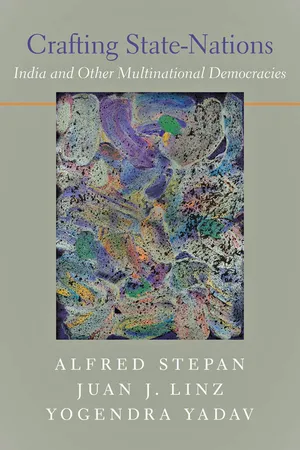
Crafting State-Nations
India and Other Multinational Democracies
- English
- ePUB (mobile friendly)
- Available on iOS & Android
Crafting State-Nations
India and Other Multinational Democracies
About this book
Political wisdom holds that the political boundaries of a state necessarily coincide with a nation's perceived cultural boundaries. Today, the sociocultural diversity of many polities renders this understanding obsolete. This volume provides the framework for the state-nation, a new paradigm that addresses the need within democratic nations to accommodate distinct ethnic and cultural groups within a country while maintaining national political coherence.
First introduced briefly in 1996 by Alfred Stepan and Juan J. Linz, the state-nation is a country with significant multicultural—even multinational—components that engenders strong identification and loyalty from its citizens. Here, Indian political scholar Yogendra Yadav joins Stepan and Linz to outline and develop the concept further. The core of the book documents how state-nation policies have helped craft multiple but complementary identities in India in contrast to nation-state policies in Sri Lanka, which contributed to polarized and warring identities. The authors support their argument with the results of some of the largest and most original surveys ever designed and employed for comparative political research. They include a chapter discussing why the U.S. constitutional model, often seen as the preferred template for all the world's federations, would have been particularly inappropriate for crafting democracy in politically robust multinational countries such as India or Spain. To expand the repertoire of how even unitary states can respond to territorially concentrated minorities with some secessionist desires, the authors develop a revised theory of federacy and show how such a formula helped craft the recent peace agreement in Aceh, Indonesia.
Empirically thorough and conceptually clear, Crafting State-Nations will have a substantial impact on the study of comparative political institutions and the conception and understanding of nationalism and democracy.
Frequently asked questions
- Essential is ideal for learners and professionals who enjoy exploring a wide range of subjects. Access the Essential Library with 800,000+ trusted titles and best-sellers across business, personal growth, and the humanities. Includes unlimited reading time and Standard Read Aloud voice.
- Complete: Perfect for advanced learners and researchers needing full, unrestricted access. Unlock 1.4M+ books across hundreds of subjects, including academic and specialized titles. The Complete Plan also includes advanced features like Premium Read Aloud and Research Assistant.
Please note we cannot support devices running on iOS 13 and Android 7 or earlier. Learn more about using the app.
Information
Table of contents
- Cover Page
- Title Page
- Copyright Page
- Contents
- Tables and Figures
- Preface
- 1 Comparative Theory and Political Practice: Do We Need a “State-Nation” Model as Well as a “Nation-State” Model?
- 2 India as a State-Nation: Shared Political Community amidst Deep Cultural Diversity
- 3 Four Indian Cases That Challenge State-Nation Theory?
- 4 Tamils in India: How State-Nation Policies Helped Construct Multiple but Complementary Identities
- 5 Tamils in Sri Lanka: How Nation-State Policies Helped Construct Polar and Conflictual Identities
- 6 Ukraine: State-Nation Policies in a Unitary State
- 7 Federacy: A Formula for Democratically Managing Multinational Societies in Unitary States
- 8 The U.S. Federal Model and Multinational Societies: Some Problems for Democratic Theory and Practice
- Bibliography
- Index